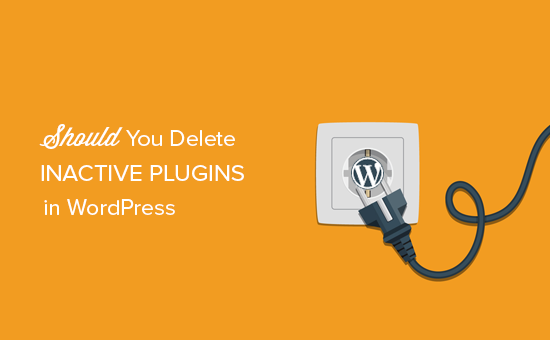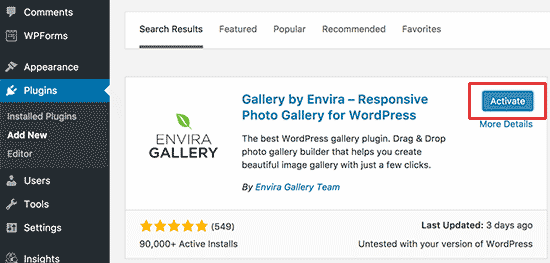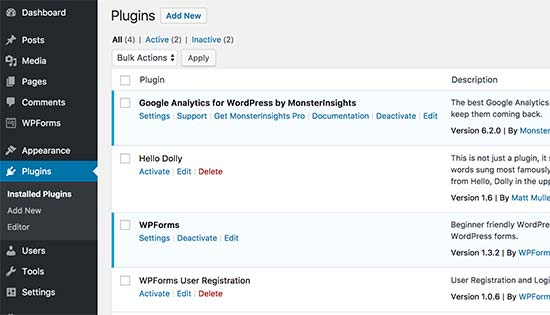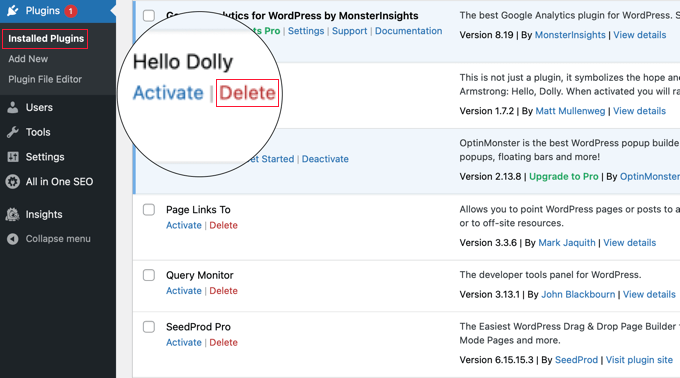Bądź szczery, ile wtyczek siedzi tam, wyłączanie, na twojej witrynie WordPress w tej chwili? Jesteśmy skłonni założyć się, że jest ich więcej niż kilka!
Próbujesz różnych rzeczy, testujesz różne rozwiązania, a czasami po prostu je wyłączasz i idziesz dalej. Często po prostu wiszą w twoim kokpicie, zbierając cyfrowy kurz na twojej stronie Wtyczki.
Niedawno otrzymaliśmy naprawdę dobre pytanie od jednego z naszych czytelników WPBeginner. Zapytał: “Czy te wszystkie nieaktywne wtyczki spowalniają moją witrynę? I czy faktycznie dobrze jest je usunąć?”.
W tym artykule zajmiemy się tą kwestią. Zbadamy, czy wyłączanie wtyczek naprawdę wpływa na wydajność twojej witryny WordPress. I dojdziemy do sedna tego, czy naciśnięcie przycisku “usuń” jest naprawdę bezpieczne (a może nawet dobrym pomysłem!).

Czym są wyłączane lub nieaktywne wtyczki w WordPress?
Najlepszą rzeczą w WordPressie jest to, że można go rozszerzyć za pomocą wtyczek WordPress. Kiedy instalujesz wtyczkę WordPress, WordPress pobiera plik wtyczki na twój serwer WWW.
Aby rozpocząć korzystanie z wtyczki, należy ją włączać.

Można instalować wtyczki i włączać je później.
Możesz również wyłączyć wtyczkę, którą wypróbowałeś, ale nie okazała się przydatna. Możesz zobaczyć wszystkie twoje zainstalowane wtyczki (zarówno aktywne, jak i nieaktywne) na stronie Wtyczki w obszarze administracyjnym WordPress.

Włączające się wtyczki są podświetlone na niebiesko, a nieaktywne wtyczki wyświetlają odnośnik “Usuń” pod nimi.
Czy nieaktywne wtyczki spowalniają WordPressa?
Nie, nieaktywne lub wyłączane wtyczki nie spowalniają WordPressa. Aby to zrozumieć, zobaczmy, jak WordPress działa za kulisami.
Za każdym razem, gdy użytkownik żąda strony z twojej witryny WordPress, WordPress rozpoczyna proces wczytywania. Podczas tego procesu wczytywane są tylko aktywne wtyczki zainstalowane na twojej witrynie internetowej. Wszystkie nieaktywne wtyczki są całkowicie ignorowane i nie są wczytywane ani nawet przeglądane.
Nawet jeśli masz dziesiątki nieaktywnych wtyczek zainstalowanych na twojej witrynie internetowej WordPress, nie będą one miały wpływu na wydajność witryny ani nie spowolnią jej działania.
Jedynym momentem, w którym WordPress szuka nieaktywnych wtyczek na twojej witrynie, jest wczytywanie strony “Zainstalowane wtyczki” w obszarze administracyjnym WordPress. Nawet wtedy szuka tylko pliku nagłówkowego wtyczki i nie wczytuje samej wtyczki.
Jeśli twoja witryna WordPress działa wolno, to nieaktywne wtyczki z pewnością nie są tego przyczyną. Zobacz nasz przewodnik na temat typowych problemów, które sprawiają, że WordPress działa wolno i jak je poprawić.
Warto również zapoznać się z naszym przewodnikiem krok po kroku, jak przyspieszyć WordPressa i zwiększyć jego wydajność.
Czy należy usunąć nieaktywne wtyczki w WordPress?
Powodem, dla którego WordPress umożliwia wyłączanie wtyczek zamiast ich bezpośredniego usunięcia, jest to, że czasami możesz po prostu chcieć tymczasowo wyłączyć wtyczkę.
Jeśli planujesz używać tej wtyczki w najbliższym czasie i obawiasz się, że usunięcie wtyczki spowoduje usunięcie jej ustawień, to powinieneś ją zachować.
W przeciwnym razie naprawdę nie ma sensu utrzymywać nieaktywnych wtyczek zainstalowanych na twojej witrynie internetowej. W rzeczywistości mogą one być czasami dość problematyczne.
Na przykład, niezależnie od tego, czy używasz tej wtyczki, czy nie, WordPress nadal będzie pokazywał aktualizacje dla tych wtyczek. Może to być nieco irytujące, zwłaszcza jeśli na twojej witrynie zainstalowanych jest wiele regularnie aktualizowanych wtyczek.
Nieaktywne wtyczki mogą być nieszkodliwe, ale nadal są plikami wykonywalnymi. W przypadku próby włamania, pliki te mogą zostać zainfekowane lub wykorzystane do zainstalowania złośliwego oprogramowania na twojej witrynie.
Jako zabezpieczenie WordPressa, powinieneś usunąć wszelkie nieaktywne wtyczki, których nie zamierzasz używać. Możesz dowiedzieć się, jak to zrobić w naszym przewodniku dla początkujących, jak prawidłowo odinstalować wtyczkę WordPress.

Przewodniki ekspertów na temat najlepszych praktyk zarządzania wtyczkami WordPress
Mamy nadzieję, że ten artykuł pomógł odpowiedzieć na twoje pytania dotyczące wyłączania wtyczek WordPress i usunięcia nieaktywnych wtyczek. Możesz również zapoznać się z innymi artykułami związanymi z najlepszymi praktykami dotyczącymi wtyczek w WordPress:
- Czym są wtyczki WordPress? Jak one działają?
- Które wtyczki WordPress spowalniają twoją witrynę?
- Przewodnik dla początkujących: Jak wybrać najlepszą wtyczkę WordPress
- Kiedy warto kupować wtyczki WordPress Premium? (Wyjaśnienie)
- Ile wtyczek WordPress powinieneś zainstalować? Co to znaczy za dużo?
- Jak prawidłowo aktualizować wtyczki WordPress (krok po kroku)
- Czy najpierw zaktualizować WordPressa czy wtyczki? (Właściwa kolejność aktualizacji)
- Czy używanie nieaktualnych wtyczek WordPress jest bezpieczne? (Wyjaśnienie)
- Czy powinieneś instalować wtyczki, które nie zostały przetestowane z twoją wersją WordPressa?
- Wtyczka WordPress vs plik Functions.php (co jest lepsze?)
Poza samym zarządzaniem twoimi wtyczkami, jeśli poważnie myślisz o zwiększeniu szybkości i wydajności WordPressa, to zdecydowanie zalecamy użycie wtyczki wydajności WordPressa, takiej jak WP Rocket.
Sami z niego korzystamy i robi on znaczącą różnicę. Obsługuje takie rzeczy jak pamięć podręczna, optymalizacja plików i inne techniki zwiększania prędkości, które wykraczają daleko poza zwykłe zarządzanie wtyczkami.
Podczas gdy usunięcie nieaktywnych wtyczek jest dobrą praktyką, WP Rocket jest narzędziem, które włącza się, aby twoja witryna była błyskawiczna dla wszystkich odwiedzających
If you liked this article, then please subscribe to our YouTube Channel for WordPress video tutorials. You can also find us on Twitter and Facebook.





Dennis Muthomi
Speed and performance is not a reason for me to remove them.
But, I have made it a habit not to keep unused plugins installed for security reasons. Even inactive plugins can potentially pose vulnerabilities if they become outdated or infected.
Totally agree with the recommendation to fully uninstall plugins you are not using rather than just deactivating.
Jiří Vaněk
Thanks for confirming my theory that inactive plugins are ignored by WordPress. In my practice, I don’t keep unused plugins on WordPress. Not because of speed, but precisely because of the potential risk of vulnerability. Basically, thanks to this article, you have confirmed that I am doing it right. Thank you for the information.
Dayo Olobayo
Thanks for clearing this up… I always thought inactive plugins might be slowing things down, but it’s good to know that’s not the case. However, I will be more mindful of keeping my plugin list clean to avoid any security vulnerabilities.
WPBeginner Support
Glad we could clear up that common misconception
Admin
Mrteesurez
For me, the reason why I keep inactive is for a fear of if plugin will be available for download again. It has happened to me twice, I got to the plugin directly to download the plugin but no find it again (has been removed or stopped).
Although, this day I don’t usually keep them much as I would have downloaded the plugin files on my system in case I later need it or it’s elements.
thanks.
WPBeginner Support
You’re welcome and there’s nothing wrong with downloading the file off your site instead of keeping the plugin inactive on your site
Admin
Chris
HI,
I have deactivated a few plugins but have not deleted them in case I want to use them later.
But the Updates to these Plugins show up on my Dashboard under the Updates and Plugin tabs.
Is there a way to turn off the notifications for updates to Deactivated Plugins?
Thanks.
WPBeginner Support
We would not recommend removing the update notification and you should keep the deactivated plugins up to date to keep your site safe.
Admin
Chris
Thanks for the reply to my question and confirming that deactivated plugins should be kept up to date.
Harwinder Karwal
Do I lose the database on deactivating a plugin?
Do I get the database after reactivating a plugin?
Any other benefit of the deactivation/activation process of the plugin (s)?
WPBeginner Support
It would depend on the plugin but you should keep the plugin data when you deactivate a plugin and don’t completely remove it so it would have all of your information when reactivating your plugin.
You would normally only have deactivated plugins on your site if you are troubleshooting a problem or have a very specific need for a plugin for a limited time.
Admin
Mark
Is there any performance benefit (or problem) in deactivating a plugin that is used to develop your site so for example Elementor or Contact Form 7. It could then be activated if you need to edit later.
WPBeginner Support
Deactivating a plugin would remove its functionality until the plugin is reactivated. If you’re not using the plugin then deactivating it could help a small amount with your site’s performance.
Admin
rakesh kumar
I do understand that inactive plugins do not slow-down you website if they are not in a very large number as they have very small footprint in your database, Since the information of the plugin is stored in the database and every time WordPress generate a new page, looks in the database, So according to me if you are not using any plugin then all the traces of that plugin must not appear on your system. If they are there then it should slow-down the website.
Max
Ok,
but plugin is a piece of code and has weight anyway. Theoreticaly it must slow down the site does it?
WPBeginner Support
No, it does not. It takes space on your hosting storage but it is not executed. It does not consume any memory to slow down WordPress.
Admin
Luis Daniel Carbia
Hey, I had this doubt and this article resolved it the correct way: concise and detailed. Thanks!
Jason
If working on a client’s site, i always like to remove any inactive plugins I do not think we will need to use. That way, your client does not intentionally or inadvertently active any plugin(s) they are not familiar with. Removing inactive plugins also lessens any hacker’s targets.